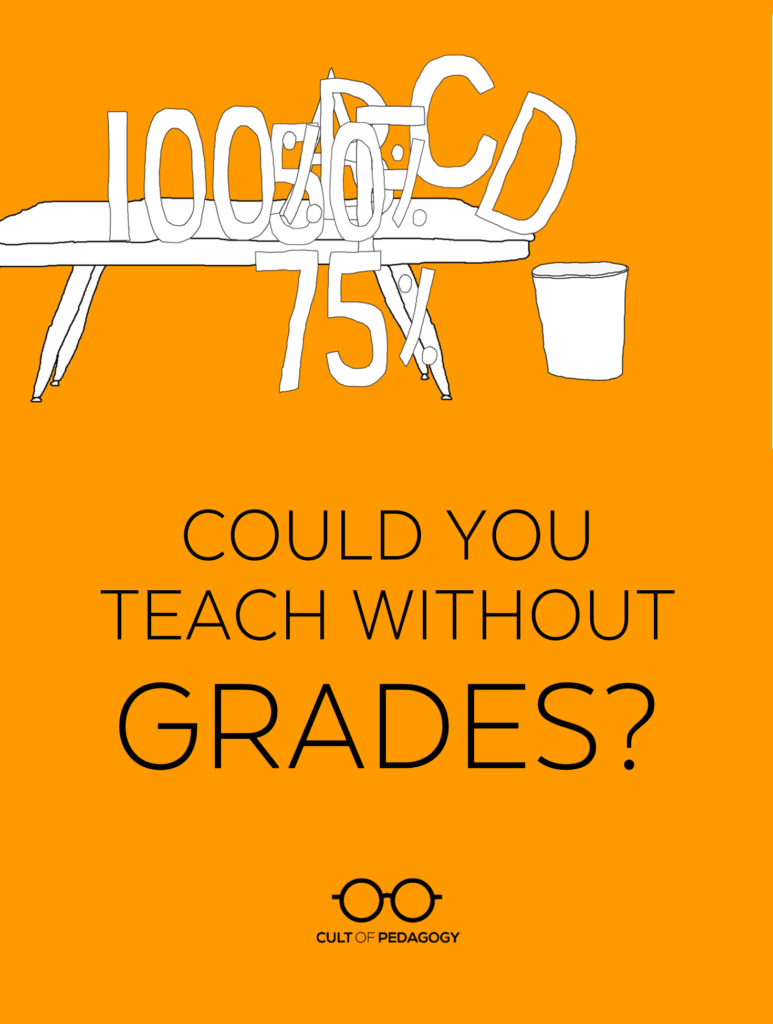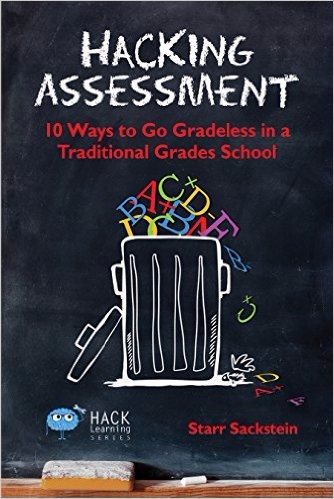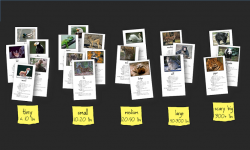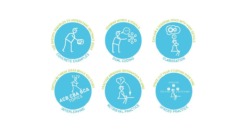
Listen to my interview with Starr Sackstein (transcript):
A few months ago, I started hearing about a new movement, where teachers were giving up traditional grading and finding new ways to measure student learning. This group, launched by education writer Mark Barnes, calls itself Teachers Throwing Out Grades (TTOG) and now has a Facebook group and a weekly Twitter Chat.
When I first became aware of the group, I admired their initiative, but the question that kept nagging at me was HOW? How do you do this, exactly? What does it actually look like? What do you write on the papers, in the gradebook, or do you have one at all? What do you tell parents? How do you distinguish between the students who are working really hard and the ones who are just coasting?

Starr Sackstein
My answers started coming from someone named Starr Sackstein (@mssackstein), a high school English and journalism teacher whose Education Week blog is called Work in Progress. In her writing, she has documented her journey this school year to abandon traditional grades through blog posts and a series of YouTube videos that feel almost like diary entries.
As I started getting a clearer picture of how the no-grades approach could actually work, I wanted to share it with you, so I invited Starr to talk with me about it. You can listen to our conversation in my newest podcast episode.
Learn more about going gradeless in Starr’s newest book, Hacking Assessment, 10 Ways to Go Gradeless in a Traditional Grades School
You can find Starr’s work on her own blog and her Education Week blog, Work in Progress. Follow her on Twitter at @mssackstein.
Other Resources Mentioned in this Episode:
A Repair Kit for Grading: Fifteen Fixes for Broken Grades, by Ken O’Connor
Assessment 3.0: Throw Out Your Grade Book and Inspire Learning, by Mark Barnes
Role Reversal: Achieving Uncommonly Excellent Results in the Student-Centered Classroom, by Mark Barnes
The 5-Minute Teacher: How do I maximize time for learning in my classroom?, by Mark Barnes
Teaching the iStudent: A Quick Guide to Using Mobile Devices and Social Media in the K-12 Classroom, by Mark Barnes
[The links above are Amazon affiliate links. When you make a purchase from Amazon through these links, I get a small commission at no extra cost to you.]
Join my mailing list and never miss another post. You’ll get weekly tips, tools, and inspiration — in quick, bite-sized packages — all geared toward making your teaching more effective and joyful. To thank you, I’ll send you a free copy of my new e-booklet, 20 Ways to Cut Your Grading Time in Half. I look forward to getting to know you better!






I am very intrigued by this interview and the concept in general. Is there much discussion on how to foster self-efficacy in students without the incentive of grades in a school culture that places so much emphasis on “the A”? I believe that authentic learning and collaboration certainly cause this self-motivating drive, but where is the causality for kids who don’t thrive even in these environments? Or kids who don’t care about learning OR grades?
Did Starr provide any information on what her Google forms entailed? I’m interested to understand her protocol a little better.
Thanks for the post!
Hi — If you click on “get transcript” above, you’ll be able to scan through a written transcript of the interview to see exactly what we talked about, or you can listen to the interview through the player above or by going to iTunes (also linked above). I’m sure Starr would be happy to answer any follow-up questions about anything the interview doesn’t cover — visit her blog or tweet her — both links are also above. Thanks!
I love this concept! I am currently homeschooling and have a middle school son who has some superhero needs. The words “grades,” “assessment,” and “test” instantly stress him out. I look forward to reading more on this since this may be the answer we are looking for.
Thank you for sharing the audio and transcript of your interview.
I too homeschool (11th and 12th grade sons) and found this to be such an insightful podcast! It was the perfect reminder when getting ready to start a new year that the focus is learning and keeping the kids engaged in their own progress. My oldest plans to teach literature after college, so I’ll have him listen to it at some point too.
This is fascinating. It is impressive to know that it is possible to attend to individual learners despite the time allocated for a lesson.
This is only possible when a teacher reflects on the impact she or he intends to make on the learner’s life.
I love when she says that it’s not about her but it’s about them and that there’s so much to learn from the kids.
Talking about what they have.
This is awesome.
Wish all educators listened to this conversation and reflects on the same.
I am inspired to share with others who can make a difference in the life of our children.
Thank you for delving into this topic. I’ve wished for most of my 22 years in education that traditional grades would be done away with. I think hearing Starr, a hs educator, presents even more convincing arguments for skeptics.
The education system is an archaic structure which is ready to be shook up. The modern world will favour the people who can self educate, keep up with the latest technologies and is constantly updating their skills.
I agree that it is time to change the grading approach or at least squeak it to refine it.
I teach in Melbourne, Australia and we assess on a continuum so we never assign letter grades and only provide feedback on daily work. It’s not perfect but I can’t imagine giving out grades!
I see students constantly looking directly for the grade and ignoring the feedback, thus not learning from their mistakes or seeing what they did great!
I think feedback is very powerful. I am thinking back to when I was in school and the grade was the first thing I checked out and then the feedback came maybe.
I found this very interesting to hear the logistics on how this type of feedback works. I would love to explore how this looks like in a primary classroom. I think it would doable .
I think feedback is very powerful. I am thinking back to when I was in school and the grade was the first thing I checked out and then the feedback came maybe.
There seems to be a lot of anxiety centered around grades in my 5th grade class this year. Frankly, I dislike the letter grade system inherently because it is ambiguous, and it does not reflect the learning journey of a student. For example, my student complained that she had received a 7/10 on a quiz, and that translated to a C. I explained that it really represents that she has acquired 70% of the skills and knowledge up to that point, which is a great percentage. I think we need to culturally shift our perspective from letter grades to percentages.
Samantha, this is a great way of looking at a 70% grade! I agree that a shift in how we approach grading will likely benefit students in the long term.